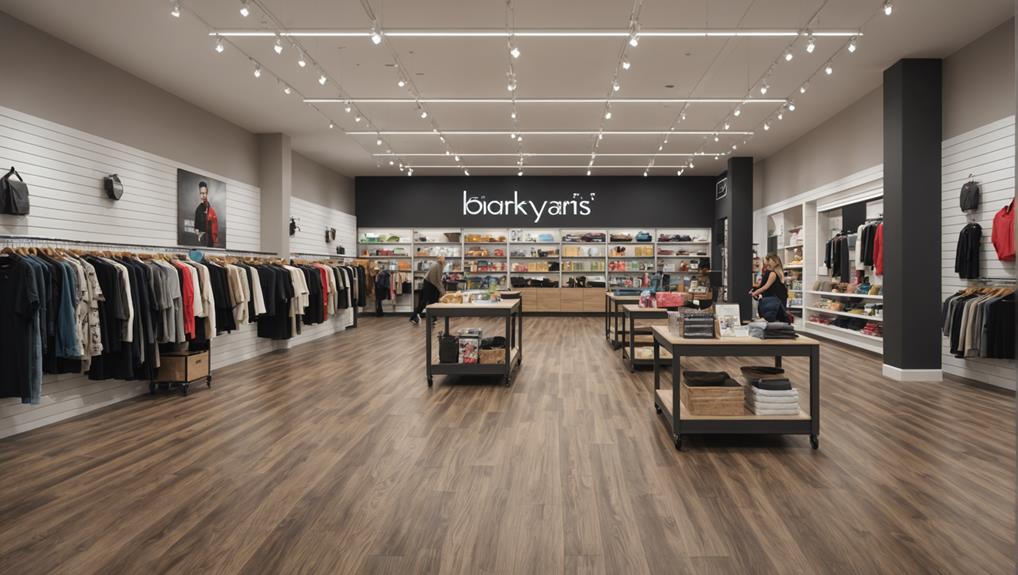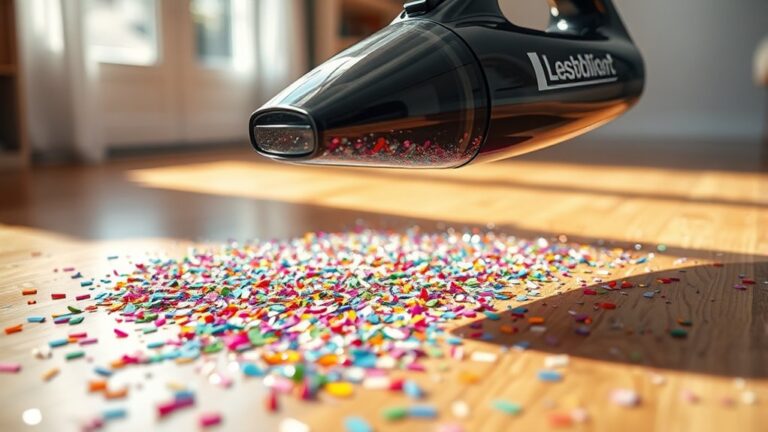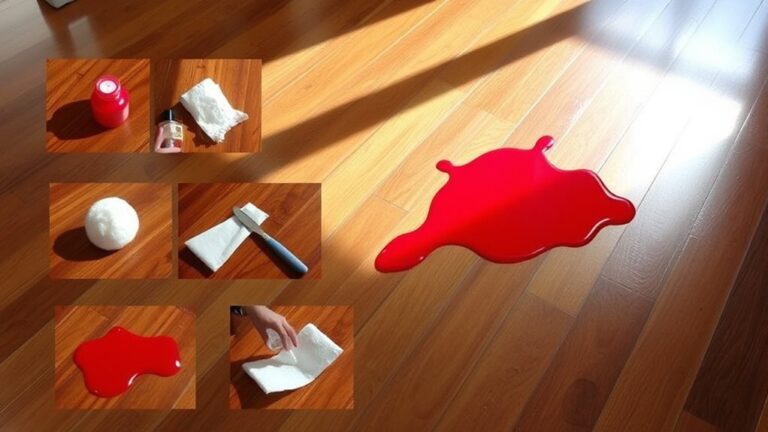When selecting durable flooring for large retail spaces, you'll want materials that stand up to high foot traffic, enhance safety, and minimize maintenance costs. Options like laminate and vinyl are excellent choices; they offer scratch resistance and are easy to clean. Tile flooring is another durable option, providing slip-resistant surfaces and versatile designs. It's crucial to choose the right finish, too, as it impacts both aesthetics and functionality. With the right flooring, you'll improve customer experience and potentially boost sales. To find out more about maximizing your retail space's flooring impact, keep exploring your options.
Importance of Durable Flooring
When it comes to retail spaces, investing in durable flooring can make or break your business. Durable flooring isn't just about looks; it's essential for maintaining a safe environment for both your employees and customers. High-traffic areas demand materials that can withstand wear and tear, reducing the risk of slips and falls. Safety should be your top priority, and choosing the right flooring can greatly minimize hazards.
Moreover, durable flooring requires less frequent flooring maintenance, which translates to cost savings over time. Regular upkeep becomes easier when the materials you choose are designed to last, allowing you to focus on your core business rather than constant repairs. This efficiency can lead to increased productivity and a better experience for your customers.
Aesthetic appeal is another important factor that shouldn't be overlooked. The right flooring can enhance the overall atmosphere of your retail space, making it inviting and encouraging foot traffic. A visually appealing environment can influence customer behavior, leading to longer visits and increased sales.
Top Flooring Options
Selecting the right flooring option for your retail space is fundamental to creating a durable and functional environment. When it comes to large retail areas, you need flooring that not only withstands heavy foot traffic but also guarantees safety for your customers and staff. Two top contenders for your consideration are laminate options and carpet alternatives.
Laminate flooring is an excellent choice for its combination of durability and aesthetic appeal. It's resistant to scratches and dents, making it ideal for high-traffic areas. Plus, modern laminate options come in a variety of finishes that can mimic natural wood or stone, enhancing your store's ambiance. Additionally, many laminate products feature slip-resistant surfaces that contribute to safety, reducing the risk of accidents.
On the other hand, if you're considering a softer underfoot option, carpet alternatives can provide comfort and sound absorption, essential for retail environments where noise levels can be high. Look for commercial-grade carpets that are designed to withstand wear and tear while being easy to clean. Some newer carpet alternatives even incorporate stain-resistant technology, guaranteeing your floors maintain their appearance even in busy settings.
Advantages of Vinyl Flooring
Offering versatility and resilience, vinyl flooring has become a popular choice for retail spaces. Its ability to withstand high foot traffic while maintaining a polished appearance makes it an ideal solution for businesses looking to create an inviting atmosphere. You'll appreciate the durability vinyl offers, particularly in environments where spills and messes are common.
One of the standout advantages of vinyl flooring is its low vinyl maintenance requirements. Unlike other flooring options, which may require extensive upkeep, vinyl can be easily cleaned with regular sweeping and occasional mopping. This not only saves you time but also reduces labor costs, allowing you to focus on your customers and operations rather than sol care.
Vinyl aesthetics play an essential role in enhancing your retail space's visual appeal. With a wide array of designs, colors, and textures available, you can achieve the look of natural materials like wood or stone without the associated costs or upkeep. This flexibility allows you to tailor your flooring to match your brand identity, creating a cohesive and attractive environment that draws customers in.
Moreover, many vinyl flooring products come with built-in safety features, such as slip-resistant surfaces, ensuring that your customers and employees can navigate the space safely. By choosing vinyl flooring, you're not only investing in a durable and beautiful option but also prioritizing the safety and satisfaction of everyone who walks through your doors.
Benefits of Tile Flooring
While tile flooring may initially seem less flexible than other options, it provides numerous benefits that make it an excellent choice for retail spaces. One of the standout advantages is its durability. Tile can withstand heavy foot traffic, making it ideal for bustling environments like stores and malls. You won't have to worry about wear and tear, as high-quality tile is resistant to scratches, stains, and moisture.
Safety is another critical factor. Many tile options come with slip-resistant surfaces, considerably reducing the risk of falls—an essential consideration for both customers and employees. When you choose tile, you're not just investing in aesthetics; you're prioritizing safety in your retail space.
From a design perspective, tile flooring offers versatility that aligns with current design trends. You can find an array of colors, patterns, and textures to complement your brand's identity. This adaptability allows you to create an inviting atmosphere that enhances customer experience.
To keep your tile looking its best, consider these maintenance tips: regularly sweep and mop to prevent dirt buildup, and use pH-neutral cleaners to avoid damaging the surface. With minimal upkeep, tile can maintain its pristine appearance for years.
Choisir la bonne finition
Reflecting on the finish of your tile flooring is vital for both aesthetics and functionality in a retail space. The right finish can enhance the visual appeal while ensuring safety for both customers and staff. When choosing finish types, you'll want to take into account slip resistance, as a textured surface can help prevent accidents, especially in high-traffic areas prone to spills.
There are several finish types to choose from, including matte, satin, and glossy. Matte finishes often provide a more subdued look and tend to hide scuff marks better, making them ideal for busy environments. Satin finishes strike a balance, offering a bit of shine without compromising on safety. Glossy finishes, while visually striking, can pose slip hazards and may require more frequent maintenance to keep them looking pristine.
Maintenance considerations are also significant when selecting a finish. Some finishes may require special cleaning products or techniques to avoid dulling. For instance, high-gloss tiles often need regular polishing, which can be labor-intensive. In contrast, matte finishes can usually be cleaned with standard floor cleaners, making them more practical for large retail spaces.
Questions fréquemment posées
How Often Should Flooring Be Maintained in Large Retail Spaces?
When it comes to flooring maintenance schedules, it's vital to establish a routine that suits your space's traffic and usage. You should conduct deep cleans quarterly and follow seasonal cleaning routines to prevent wear and tear. Regular inspections are important to identify issues early, ensuring a safe environment for everyone. By staying on top of maintenance, you'll not only prolong the life of your flooring but also enhance safety and appearance in your establishment.
Are There Eco-Friendly Flooring Options Available for Large Retail Areas?
Choosing eco-friendly flooring's like planting seeds for a sustainable future. You'll find options like bamboo and cork that use sustainable materials, ensuring safety for both people and the planet. While initial costs might be higher, consider long-term savings from durability and reduced maintenance. Investing in these materials not only enhances your space but also aligns with eco-conscious values, making your area both beautiful and responsible. Keep safety and sustainability at the forefront of your decisions.
What Is the Average Lifespan of Durable Flooring Materials?
When considering the average lifespan of durable flooring materials, it varies widely. Luxury vinyl typically lasts 10-20 years, depending on maintenance and usage, while concrete polishing can endure 20-30 years or more with proper care. Both options offer safety benefits, as they can withstand heavy foot traffic and resist wear. Choosing the right flooring for your needs guarantees longevity, enhancing the overall environment while minimizing replacement costs in the long run.
How Do Flooring Choices Impact Store Acoustics and Noise Levels?
How much do you think flooring choices affect the noise levels in your store? The right flooring materials can greatly impact sound absorption and overall acoustics. Higher material density often translates to better noise reduction, creating a more pleasant shopping environment. By selecting flooring that minimizes sound transmission, you not only enhance customer experience but also promote safety by reducing distractions. It is crucial to take into account acoustics when planning your store's layout and design.
Can Flooring Installation Disrupt Store Operations or Customer Experience?
Yes, flooring installation can disrupt store operations and customer experience. If you choose the wrong installation timing, it can interfere with customer flow, potentially leading to safety hazards. To minimize disruptions, plan installations during off-peak hours or when the store is closed. This approach guarantees a smoother shift, maintaining a positive shopping environment. Prioritizing safety and convenience during installation not only protects customers but also enhances overall operational efficiency.




